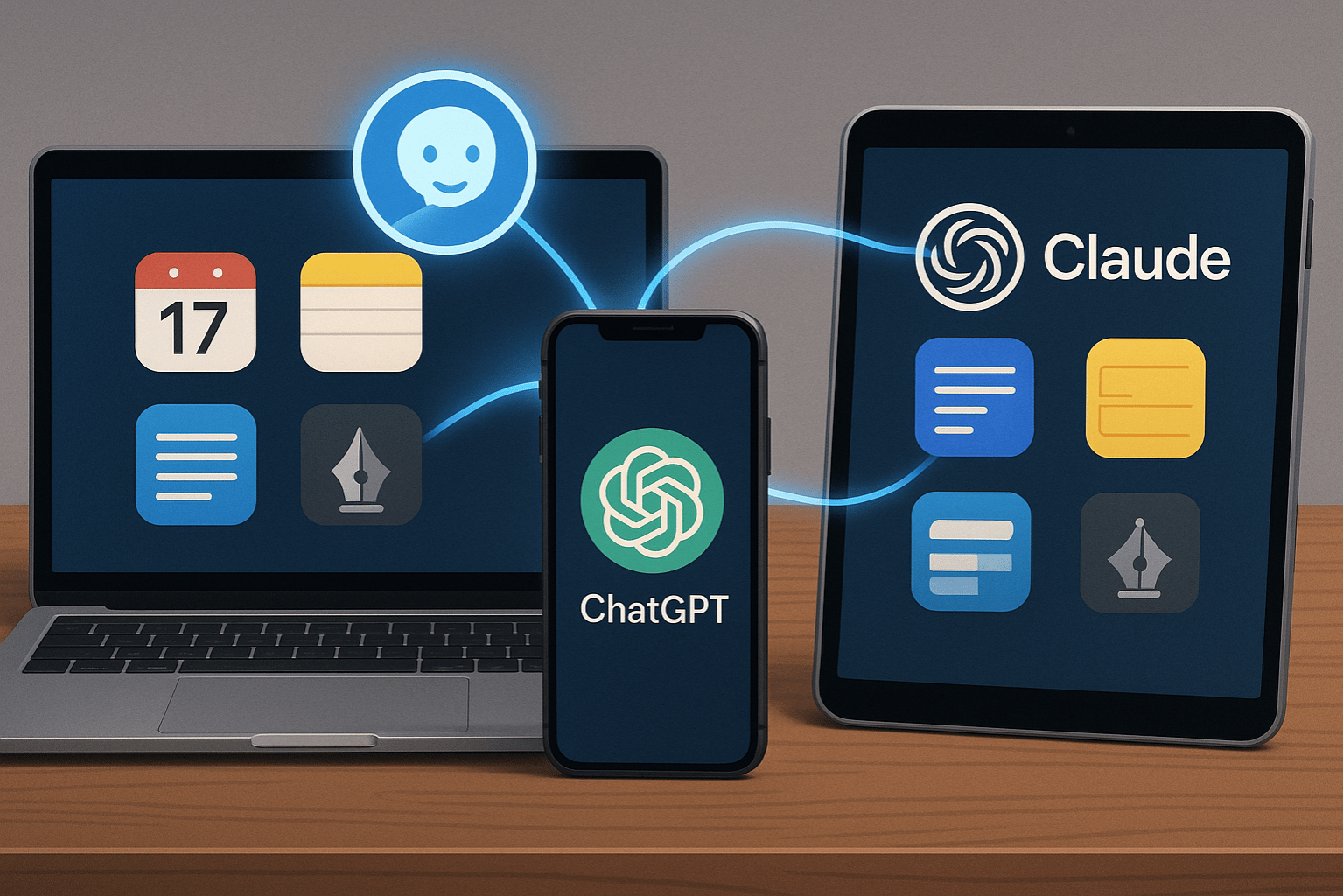
Concept image of Apple preparing MCP support, enabling AI assistants like ChatGPT and Claude to interact directly with apps on Mac, iPhone, and iPad. Image Source: ChatGPT-5
Apple Tests MCP Support to Bring Agentic AI to Mac, iPhone, and iPad
Key Takeaways: Apple MCP Support and Agentic AI
Apple is preparing to adopt MCP (Model Context Protocol), an open standard created by Anthropic for connecting AI systems to apps and data sources.
Code in the new iOS 26.1, iPadOS 26.1, and macOS Tahoe 26.1 betas indicates Apple will link MCP with its App Intents framework.
This could let AI agents like ChatGPT or Claude autonomously take actions across Mac, iPhone, and iPad apps.
MCP is already supported by companies including Google, Notion, Zapier, Salesforce, and OpenAI, creating a broad interoperability ecosystem.
Apple’s support is still in early stages but signals a move toward enabling agentic AI assistants on its devices.
Apple Betas Hint at MCP Adoption
With the rollout of developer betas for iOS 26.1, iPadOS 26.1, and macOS Tahoe 26.1, Apple has introduced code pointing to MCP (Model Context Protocol) integration.
MCP, launched by Anthropic in November 2024, has quickly become a standard for connecting AI systems with external platforms. The protocol provides a universal way for AI assistants to access apps, APIs, and data sources — in much the same way HTTP enables the web or SMTP enables email.
By supporting MCP within its App Intents framework, Apple appears to be preparing for a future where agentic AI can interact directly with apps on Mac, iPhone, and iPad.
What MCP Enables Across Platforms
Anthropic designed MCP to break down silos between AI models and the systems they operate in. Instead of requiring custom integrations for each app or data source, MCP standardizes the interface, letting AI agents act more flexibly.
Examples highlighted by the ModelContextProtocol.io initiative include:
Agents connecting to Google Calendar and Notion for personalized scheduling.
Claude Code generating a complete web app from a Figma design.
Enterprise chatbots querying multiple databases for organization-wide insights.
AI models creating 3D designs in Blender and sending them directly to a 3D printer.
Since launch, MCP has been adopted by platforms such as Zapier, Notion, Google, Figma, OpenAI, Salesforce, and others, creating a broad interoperability layer for AI.
Apple’s App Intents Framework: A Bridge to MCP
The App Intents framework, which Apple says is designed to “deeply integrate your app’s actions and content with system experiences across platforms, including Siri, Spotlight, widgets, controls and more,” already enables users to personalize how they interact with their devices. With Apple Intelligence and recent enhancements to App Intents, Siri can now suggest app actions, help people discover features, and even take actions in and across apps.
By adopting the App Intents framework, developers can allow people to instantly use app functionality through:
Interactions with Siri, including those powered by the personal context awareness and action capabilities of Apple Intelligence.
Spotlight suggestions and search.
Actions and automations in the Shortcuts app.
Hardware interactions such as the Action button and squeeze gestures on Apple Pencil.
Focus modes that help people reduce distractions.
With MCP support layered onto this foundation, Apple is giving developers a system-level pathway for AI models like ChatGPT or Claude to take actions across apps — without requiring custom MCP integrations for each individual app.
Early Stage, But Promising
The code found in Apple’s 26.1 betas represents the first visible signs of MCP integration, but the implementation is still at an early stage. It may be months before any official release or announcement.
Still, the discovery signals Apple’s intent to bring agentic AI to its devices, enabling autonomous assistants to act across apps in ways that could reshape how users interact with Mac, iPhone, and iPad.
Q&A: Apple MCP Integration
Q: What is MCP?
A: The Model Context Protocol (MCP) is an open standard from Anthropic that lets AI systems connect to apps, APIs, and data sources.
Q: Which companies already support MCP?
A: Zapier, Notion, Google, Figma, OpenAI, Salesforce, and others have adopted the protocol.
Q: How is Apple using MCP?
A: Code in the new betas shows Apple preparing to integrate MCP into its App Intents framework, allowing AI agents to access app functionalities.
Q: What does this mean for users?
A: In the future, users could enable AI assistants like ChatGPT or Claude to autonomously take actions across apps on Mac, iPhone, and iPad.
Q: When will MCP support launch on Apple devices?
A: The feature is still in early development, and no launch date or formal announcement has been made.
What This Means: Apple and Agentic AI on Devices
By preparing to adopt MCP, Apple is signaling a major shift: it intends to bring agentic AI capabilities directly into the core of iOS, iPadOS, and macOS.
This move could lower the barrier for developers, allowing AI models to interact with apps without extensive custom integrations. For users, it promises a future where AI assistants handle actions seamlessly — from scheduling to design to workflow automation — across devices.
Strategically, supporting MCP aligns Apple with an emerging industry standard that already includes Google, OpenAI, and Salesforce, ensuring its devices remain central in the broader AI ecosystem. While implementation is still in early stages, Apple’s adoption could accelerate the path toward truly connected, autonomous AI experiences on personal devices.
Editor’s Note: This article was created by Alicia Shapiro, CMO of AiNews.com, with writing, image, and idea-generation support from ChatGPT, an AI assistant. However, the final perspective and editorial choices are solely Alicia Shapiro’s. Special thanks to ChatGPT for assistance with research and editorial support in crafting this article.
